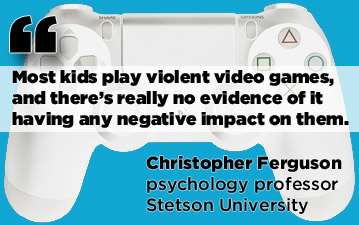Blaming Violence on Video Games Does More Harm Than Good, Researcher Says
Don't believe the hype: The latest study linking video games and antisocial behavior is just as flawed as the rest of them.


Yet another study claims to have found a link between playing violent video games and real-world violent behavior. But like many that came before it, the study relies more on correlation than causation. And by focusing on the video games themselves instead of real-world behavior, researchers, parents and gamers are getting distracted from the real issues at play.
In this particular study published in the journal Educational Media International, researchers from Brock University in Ontario, Canada, evaluated 109 students ages 13 to 14 and found a correlation between playing violent video games and lower-than-average empathy and empathic development.

The study measured students' empathy using a test called "Sociomoral Reflection Measure-Short Form" or "SRM-SF," and defined violent video games as games that "include depictions of or simulations of human-on-human violence in which the player kills or otherwise causes serious physical harm to another human."
MORE: 10 Most Anticipated Games 2014
According to the study's data, a correlation can be drawn between children who play violent video games for three or more hours a day and low scores on the SRM-SF. The study did not find any correlation between playing nonviolent video games and children's SRM-SF scores.
Studies that link violent video games and real-world violent behavior are nothing new; in fact, they make headlines so frequently that you might think everyone had already accepted it as fact.
However, for every study that claims to correlate violence and video games, there's at least another that found no such connection.
Sign up to get the BEST of Tom's Guide direct to your inbox.
Get instant access to breaking news, the hottest reviews, great deals and helpful tips.
Inconsistent results
"There's data all over the place," said Christopher Ferguson, a professor of psychology at Stetson University who studies the link between violence and the media. "Some studies do find effects; some don't. There's no consistency."
In fact, "Most kids play violent video games, and there's really no evidence of it having any negative impact on them," Ferguson said. "Kids today are actually less aggressive than they were 20 or 30 years ago."
Ferguson also pointed out that this new study, like many others, does not analyze whether playing the video games caused the children's alleged lack of sociomoral development, or whether the lack of sociomoral development caused them to seek out video games — violent or otherwise — in the first place.
MORE: 20 Best Android Games
If it's the latter, then simply forbidding the child from playing violent video games will not adequately address the true issues at hand.
"There's a risk that [debating whether video games cause violent behavior] distracts people from more pressing issues, like mental-health reform or educational disparities," Ferguson said.
Violent video games are not the problem. They may not even be a symptom — most U.S. children play video games today.
It's quite easy, and even encouraged, to blame video games for antisocial or even violent real-world behavior. However, despite its conclusion that "playing violent video games may hinder moral development in some adolescents," this new report does not offer any evidence proving that the one leads to the other.
Email jscharr@techmedianetwork.com or follow her @JillScharr and Google+. Follow us @TomsGuide, on Facebook and on Google+.
Jill Scharr is a creative writer and narrative designer in the videogame industry. She's currently Project Lead Writer at the games studio Harebrained Schemes, and has also worked at Bungie. Prior to that she worked as a Staff Writer for Tom's Guide, covering video games, online security, 3D printing and tech innovation among many subjects.
-
WilmaSJaeger my friend's aunt makes $67 every hour on the laptop . She has been out of a job for six months but last month her check was $21747 just working on the laptop for a few hours. published here,,,,,,,,,,,,,,,,,,www.Fizzjob.CoMReply
